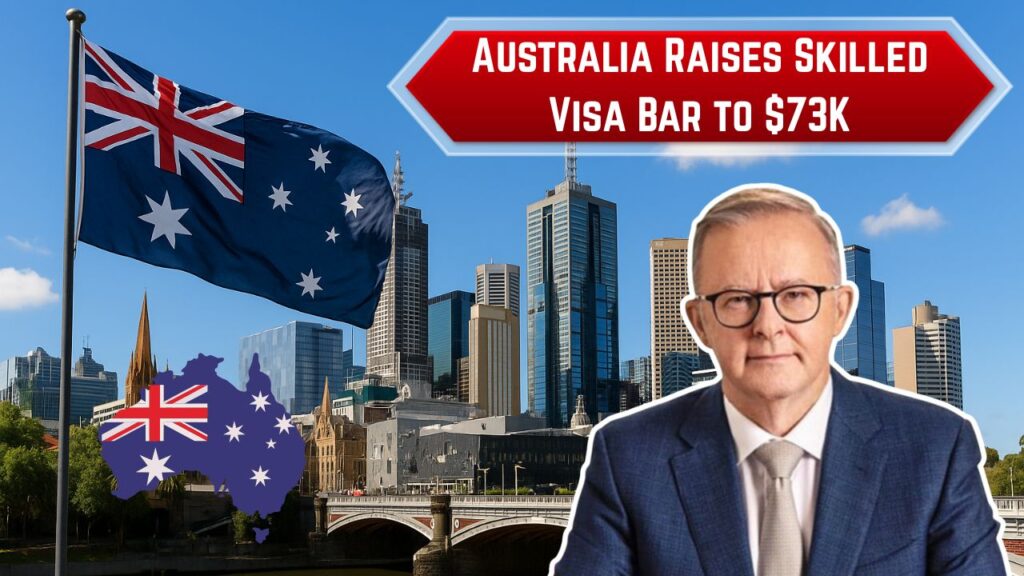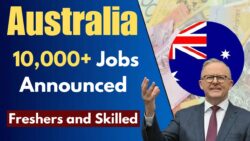Australia Raises Skilled Visa Bar – Australia has officially raised the income threshold for skilled visa applicants to $73,000 per year starting November 2025, marking a major shift in migration policy. The change comes as part of the government’s effort to attract high-quality professionals while ensuring fair wages and reducing exploitation in the labour market. This adjustment aims to strengthen Australia’s skilled migration system and align it with the evolving cost of living and workforce demands. Thousands of international workers planning to apply for permanent residency or temporary work visas will now need to meet this higher salary requirement.

New Skilled Migration Income Threshold Explained – $73,000 Minimum Requirement
The Australian Government has confirmed that from November 2025, the Temporary Skilled Migration Income Threshold (TSMIT) will rise from $70,000 to $73,000. This new benchmark is part of the government’s broader plan to modernize its migration framework and ensure that skilled workers are fairly compensated. The policy primarily targets those applying for employer-sponsored visas, including Subclass 482 and Subclass 186. By setting a higher threshold, Australia aims to attract qualified professionals in key sectors such as engineering, healthcare, IT, and construction, ensuring that local and international workers compete on equal terms.
 $1,000 Speeding Fine Confirmed for Aussie Drivers – Licence Loss for 45 km/h Over Limit Starts 2025
$1,000 Speeding Fine Confirmed for Aussie Drivers – Licence Loss for 45 km/h Over Limit Starts 2025
Impact of the $73,000 Skilled Visa Threshold on Applicants and Employers
Raising the TSMIT to $73,000 will have direct implications for both employers and visa applicants. Employers will now be required to pay a minimum salary that matches or exceeds this figure when sponsoring foreign talent. This ensures that overseas professionals are not underpaid compared to local employees. For potential migrants, it may slightly narrow eligibility, as they must now demonstrate a higher earning potential. However, the move is expected to promote genuine skill-based hiring and prevent misuse of lower-wage sponsorships. Sectors facing skill shortages are likely to continue benefiting under this new wage standard.
Also Check : Australia Tourist Visa Rules Changed Now in 2025
Australia’s Policy Vision – Balancing Skilled Migration with Workforce Needs
The $73,000 income threshold increase is part of Australia’s long-term migration reform strategy designed to ensure the system remains competitive and fair. The government is focusing on attracting workers who contribute to innovation, productivity, and sustainable economic growth. The updated income benchmark also reflects inflationary pressures and changing market conditions. Skilled migration programs will now align more closely with domestic labour policies, offering opportunities for highly qualified individuals while safeguarding job prospects for Australians. This reform underlines Australia’s commitment to a fair and future-ready migration system.
What Skilled Workers Need to Prepare Before November 2025
Prospective visa applicants must now carefully review their eligibility, employment contracts, and salary offers to ensure they meet the $73,000 threshold. Those already in Australia on temporary visas may need to renegotiate their terms with employers before renewal or transition to permanent residency. It is also essential for applicants to gather strong documentation, including employment proof, qualifications, and experience evidence. Migration agents recommend lodging applications before the new rules take effect if current eligibility criteria are easier to meet. Planning ahead will be key to avoiding rejection under the tightened standards.
Read Also : New Immigration Rules to Attract Global Talent Revealed
FAQs
1. When will the new skilled visa income threshold apply?
The new $73,000 threshold will take effect from November 2025.
2. Which visa subclasses are affected by this change?
The update impacts employer-sponsored visas like Subclass 482 and 186.
3. Why did Australia raise the income limit for skilled migrants?
To ensure fair wages, attract highly skilled talent, and prevent wage exploitation.
4. Will this make it harder to get a skilled visa in 2025?
Yes, slightly, as applicants must now prove higher earning potential and skill level.






